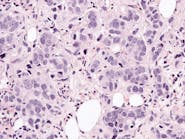Men and women have different obesity drivers, pointing to the need for tailored interventions
A new study from UCLA researchers finds sex-specific brain signals that appear to confirm that different drivers lead men and women to develop obesity. The study, appearing in the peer-reviewed journal Brain Communications, combined data from several modes of MRI with patients’ clinical features and personal histories to identify sex-specific mechanisms in the brain underlying obesity.
The new study supports and corroborates many findings from earlier studies and provides MRI evidence of differences in brain structure, function, and connectivity that may help researchers better understand obesity-related drives and behaviors. For example, alterations in certain brain networks suggest that compared to men, women with a high body mass index (BMI) may be more keenly aware of and drawn to highly processed foods, with an increased risk of developing cravings and food addiction.
The study, conducted through the G. Oppenheimer Family Center for Neurobiology of Stress and Resilience, Ingestive Behavior and Obesity Program at UCLA, included 183 participants, ages 18-55. Forty-two males had non-obese BMI, 23 males had high BMI, 63 females had non-obese BMI, and 55 females had high BMI. All participants filled out a battery of self-report questionnaires assessing childhood trauma, anxiety and depression, visceral sensitivity, food addiction, bowel symptoms, personality traits, and many other factors.
Each participant also underwent three different brain MRIs to assess structure, function and connectivity. Data sets from the three scans and from clinical information were analyzed using an analytical tool that seeks to identify a limited number of variables from multiple data sets to predict an outcome.
The results show specific network connectivity changes associated with high BMI, regardless of sex. In females, the study identified brain regions and networks with alterations associated with early life trauma. These appear consistent with previous observations that females with obesity, compared to males, may have greater anxiety, lower resilience and difficulty integrating emotions with action-directed goal planning. Females also may be more susceptible to the sight, smell and taste of ultra-processed foods.





